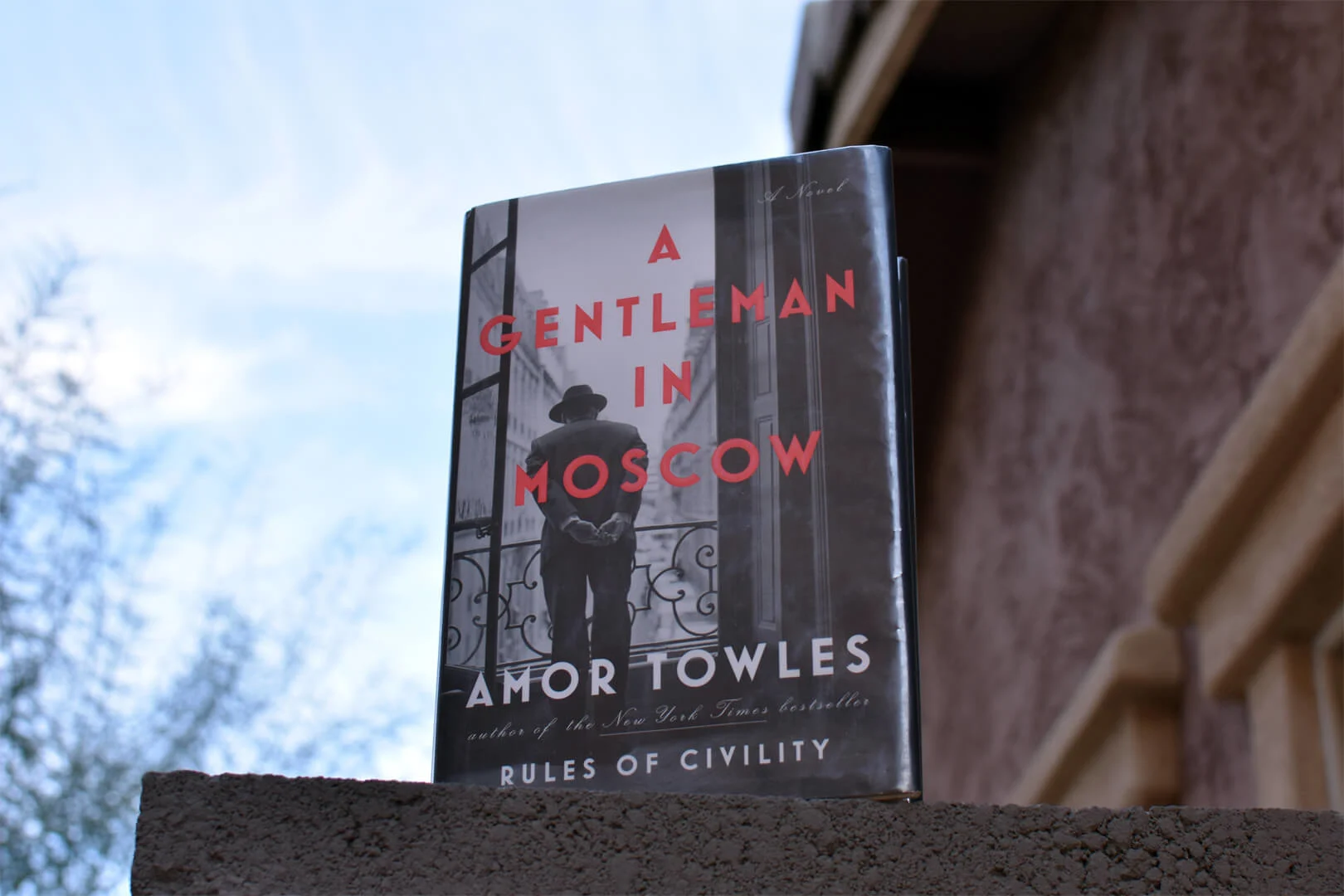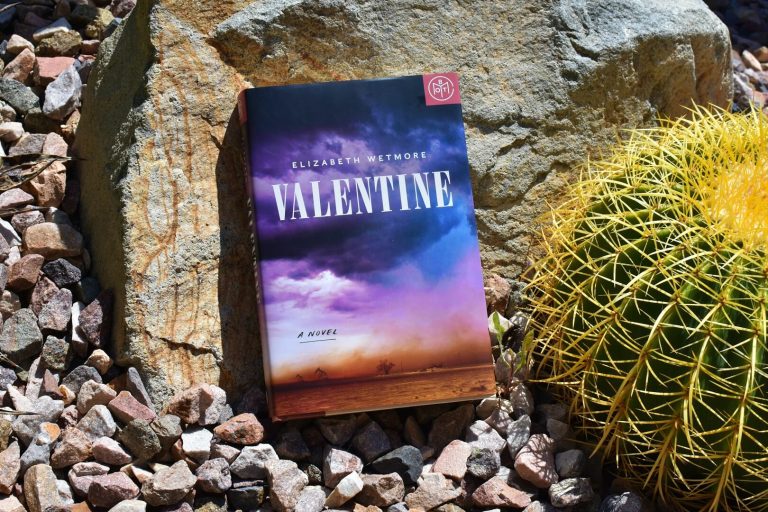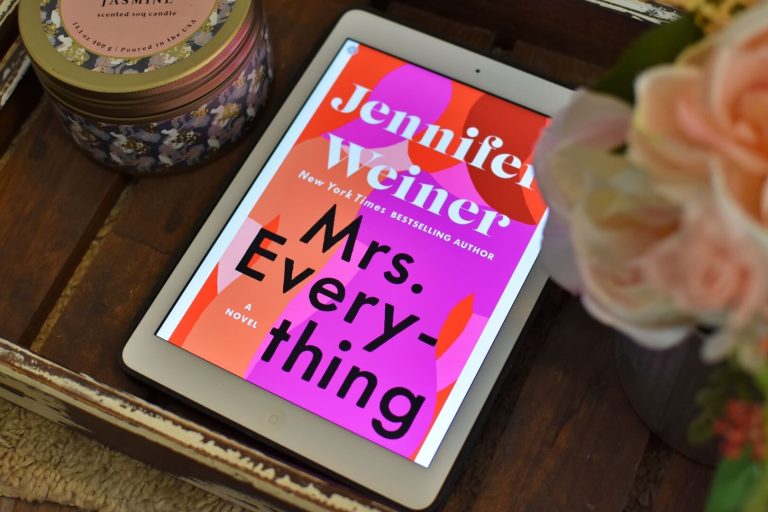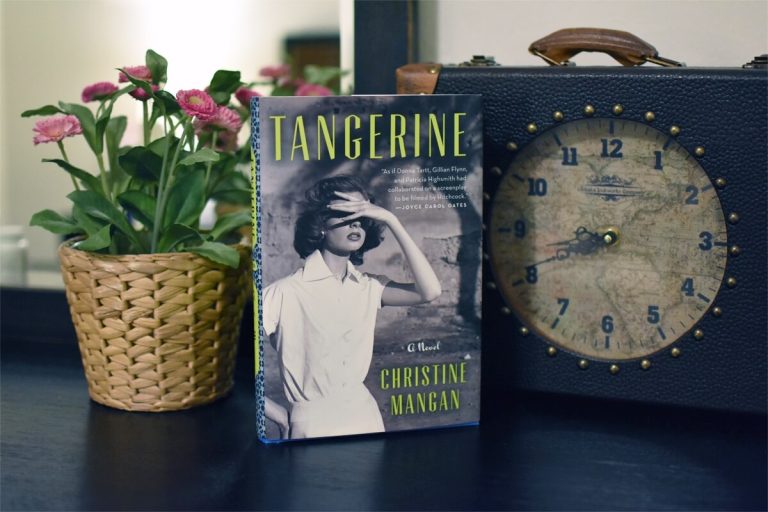This post contains links to products that I may receive compensation from at no additional cost to you. View my Affiliate Disclosure page here.
Book club questions for A Gentleman in Moscow by Amor Towles provides an in-depth look at this enjoyable novel. The following book club questions will spoilers so if you haven’t read the novel yet, check out my review first.
The synopsis:
In 1922, Count Alexander Rostov is deemed an unrepentant aristocrat by a Bolshevik tribunal, and is sentenced to house arrest in the Metropol, a grand hotel across the street from the Kremlin. Rostov, an indomitable man of erudition and wit, has never worked a day in his life, and must now live in an attic room while some of the most tumultuous decades in Russian history are unfolding outside the hotel’s doors. Unexpectedly, his reduced circumstances provide him entry into a much larger world of emotional discovery.
Since there’s so much going on with this book, I have divided the book club questions for A Gentlemen in Moscow into the five sections (books) and the afterward. So have your copy handy as your book club discusses this one!
Book Club Questions for A Gentlemen in Moscow
Book One
- The year is 1922 and Rostov is about to spend seemingly the rest of his life at the Metropol hotel. Yet, for a man sentenced to house arrest, he’s fairly cheerful and doesn’t seem that daunted. As you’re reading this section, what did you think about his unusual reaction? Were you surprised he wasn’t devastated? What does this say about Rostov’s character? How would you have reacted if you were him?
- It’s no one’s choice to be under house arrest but I suppose if it has to happen, at least the Metropol is a posh hotel. What did you think about the descriptions of the hotel? What about Rostov’s room in the attic?
- From the start, there’s plenty of philosophical observations. On page 14, the Count reflects about how we say goodbye to friends and family, however, there’s not much experience parting with our dearest possessions. He says:
”We come to hold our dearest possessions more closely than we hold our friends.”
What did he mean by this? Do you agree with him? Why or why not? - On page 40, when the Count is dining alone, he has a fateful meeting with Nina as a child. Let’s talk about their first interaction and why it was impactful for both of them.
- On page 55, where the Count is started to feel claustrophobic a bit in the hotel, he reflects on the stories of legends. For instance, on the island of Crete, Theseus had his Ariadne and her magical ball of thread to lead him safely. Odysseus had Tiresias and Dante had his Virgil. And the Count has Nina. Let’s talk about how when lost, Nina helped the Count find his way.
Book Two
- In book two, we meet Mishka, the Count’s old friend. What were your impressions of him and their friendship?
- Why were the first interactions between Count and Anna so awkward? Were you surprised they end up developing a romance?
- The chapter called ‘Anonymity’ is dedicated to how the Count starts feel to invisible. Why do you think he felt this way?
- On page 147, we learn about the fateful night of Princess’ Novobaczky’s birthday and how that in a sense, this set the Count’s life in a different direction. He expands on this story when he’s talking with a Brit at the bar. On page 163 he says:
”It is a chain of events. That night at the Novobaczskys’ when I magnanimously tore his marker, I knew perfectly well that word of the act would reach the Princess; and I took the greatest satisfaction in turning the tables on the cad. But if I had not so smugly put him in his place, he would not have pursued Helena, he would not have humiliated her, I would not have shot him, he might not have died in Masuria, and ten years ago I would have been where I belonged—at my sister’s side—where she finally breathed her last.”
Do you agree with the Count that one action can set other events in motion? Is it fate or do you believe it’s all chance? - At the end of the section, the Count is about to commit suicide until the handyman, Abram interrupts him. Why do you think seeing the apple trees in bloom have such a positive effect on the Count? What did the apples represent to the Count?
Book Three
- Why did the Count start working as a waiter?
- We get to know the relationships between the Count, the chef Emile and the host Andrey in Book Three. Why do you think the three became so close? What did you think about their dynamics?
- Throughout the entire story, there are tidbits of Russia and its complicated history in the early 20th century. In what ways did what was happening outside the hotel impact the hotel itself?
- While Nina was an adventurous child, she grew up to become quite a serious adult. After her husband is arrested and sentence to Lubyanka for five years, she is determined to follow him. She asks the Count to watch her daughter Sofia until she gets herself settled. On page 234, it says:
”This entire exchange—from Nina’s saying the Count’s name to her passing through the hotel’s doors—has taken less than fifteen minutes. So the Count had little more than a moment to consider the nature of the commitment he was being asked to make.”
While he acknowledges his own lack of experience with children, he felt that he owed it to Nina for helping him all those years back. Let’s talk about all of this and how it changed the Count and Sofia’s life forever. When did the Count start to consider Sofia is his own daughter? - Upon what turns out to be Mishka and the Count’s last interaction, Mishka is met with kindness by Emile and Andrey. This causes Mishka to say to the Count:
”Who would have imagined, when you were sentenced to life in the Metropol all those years ago, that you had just become the luckiest man in all of Russia.”
What do you think he meant by that? In what ways was the Count lucky to be in the Metropol? - This section has many key developments including the Count educating Osip about French and American culture and also meeting the American Richard. And when Sofia is injured, without hesitation despite house arrest, the Count runs out and takes her to a hospital. At the hospital, Osip assures him that Sofia will be fine and taken care of but that the Count must go back to the hotel. The Count says he doesn’t know how to repay him and Osip says:
”Alexander, you have been at my service for over fifteen years. It is a pleasure for once to be at yours.”
Let’s talk about the significance of human connection for this entire section.
Book Four
- Book Four begins in 1950 and the Count is remaking about how his daughter’s journey from thirteen to seventeen happened in a “blink of an eye.” Can you relate to this? Let’s now discuss how Sofia is different from Nina, do you think part of this is because she was raised by the Count and many members of the hotel staff?
- We learn that the American Richard and the Count consider themselves “old friends” despite only knowing each for four years. But it’s because they were kindred spirits and found common ground. They felt they had more in common with each other than they had with the majority of their own countrymen. Why do you think that is? Do you believe some people are just meant to become friends?
- On page 368, when Katerina tells the Count that is beloved friend Mishka has passed, we learn that the Count didn’t write the poem that resulted in his house arrest but Mishka did. He took credit for the poem because given Mishka’s background, he would have been taken away but not the Count. The Count then says:
”The irony, of course, is that the life which ended up being saved was mine, not his. But for that poem, they would have shot me back in 1922.”
Let’s discuss this section and its implications.
Book Five
- We learn right at the beginning that Sofia has been invited to perform with the orchestra in Paris but she at first declined it because she didn’t want to leave the hotel or the Count. He fears that they have done her a disservice in the way, having her mainly be in the building—that there’s a whole big world out there for her to see. But at the same time, he realizes that since he’s confined to the hotel, she might never leave. He tells her:
”One does not fulfill one’s potential by listening to Scheherazade in a gilded hall, or by reading the Odyssey in one’s den. One does so by setting forth into the vast unknown—just like Marco Polo when he travels to China, or Columbus when he travels to America.”
What is he telling her there? And does it also relate to his own situation? Is that when he started to set in motion leaving the hotel? - The following chapters show how the Count is plotting his escape. What did you think about those sections? Were you surprised by any of it?
- Where does Sofia go next? Do you think she’ll go to America? Will she ever see the Count again?
Afterword
- Let’s discuss the ending! Were you surprised that the Count stayed in the country? Is Ann the willowy woman at the end?
- What are some of the key themes of the novel for you?
What to read next
Hope you enjoyed book club questions for A Gentleman in Moscow! However, if you enjoyed this one, you’ll like the next two listed below. (Click the titles or photos to purchase from Amazon.)
Where the Crawdads Sing by Delia Owens is a beautifully-written novel that will stay with you long after you finish the last page. Set in coastal marshes of North Carolina, the story is part coming-of-age tale, a murder-mystery, romance with some courtroom drama mixed in. The story starts off in late 1969 and town heartthrob Chase Andrews is found dead. Locals immediately suspect Kya Clark, the so-called Marsh Girl, who was left to raise herself in the marshes of North Carolina when her family abandoned her at a young age. While Kya is dismissed as ‘marsh trash,’ in reality, she’s sensitive and intelligent. When two young men from town become intrigued by her, it changes all their lives forever.
Order the book on Amazon here. You can find my discussion questions here.
The Great Alone by Kristin Hannah is a gripping story about survival and human resilience. The story is about a family that moves to Alaska in 1974. The father, Ernt Allbright, is a former POW that comes home from the Vietnam War a changed and volatile man. He makes the impulsive decision to move his family to Alaska where they will live off the grid in America’s last frontier. The mother, Cora, will do anything and go anywhere for Ernt, even if it means following him into the unknown. Their thirteen-year-old daughter Leni is caught in the riptide of her parents’ passionate and stormy relationship. But she hopes that the new land will lead to a better future for her family. At first, Alaska seems to be the answer to their prayers. In a wild, remote corner of the state, they find a fiercely independent community of strong men and even stronger women. But as winter approaches and darkness descends on Alaska, Ernt’s fragile mental state deteriorates and the family begins to fracture.
Order the book on Amazon here. You can find my discussion questions here.
Happy reading!









Rory Barlew
Tuesday 26th of March 2019
At the beginning, it seemed a contrivance for the Count to be "exiled" into an international hotel. I did not equate it with Siberia and the Steppes, or even house arrest. I would love to add a discussion of the Soviet's punishments, and why "exile in country" would be considered a greater punishment than exile from one's homeland.